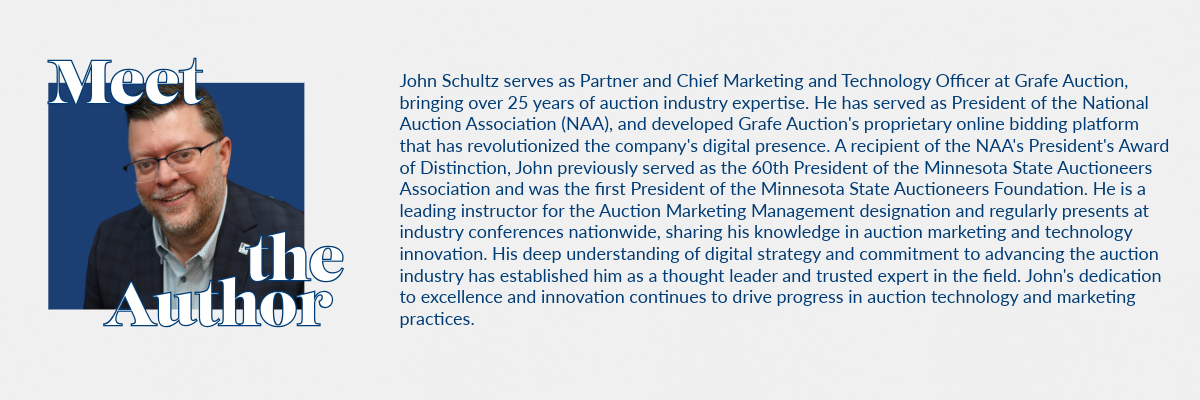The Power of Collaboration in the Auction Industry

The auction industry has always balanced on the line between competition and cooperation. On one hand, we’re entrepreneurs by nature — fiercely independent, driven to win the next deal. On the other, our best and most sustainable successes often come when we work together.
We’ve found that the deeper you lean into a cooperative mindset, the more long-term financial success you’ll enjoy. Staying in a purely competitive posture can cost you in two ways: you either miss out on deals entirely, or you take on work outside your specialty and underdeliver — hurting your brand, your client relationship, and the profession as a whole.
Today’s clients expect more than just a competent auctioneer. They expect the expert for their specific asset class. And here’s the truth: no auction company is the expert in every category. While the entrepreneurial drive pushes us to believe we can sell anything with the right marketing — and there’s truth in that — the best results happen when we build a strong team of specialists. Collaboration makes that possible.
Collaboration in Action: How Partnerships Expand Reach and Results
At Grafe Auction, collaboration isn’t an occasional strategy — it’s a core part of how we deliver value. Our partnerships span industries, geographies, and specialties, creating opportunities neither party could capture alone.
Specialized Retail Liquidation with Gordon Brothers
One of our most visible collaborations is with Gordon Brothers’ Retail Assets Division. Their expertise lies in inventory management and liquidation, while our specialty is the sale of furniture, fixtures, and equipment (FF&E) from closed retail locations and distribution centers. By combining strengths, we offer clients a comprehensive solution — they get top-tier execution in both inventory and FF&E sales without juggling multiple vendors.
Bankruptcy Court Auctions with Dudley Resources
We also have a standing partnership with Dudley Resources, a Virginia-based auction company, for U.S. Bankruptcy Court asset sales. These auctions span the country, but our licensure in all 50 states and over 400 municipalities makes the process seamless. Dudley Resources brings in the work, and we ensure compliance and execution without delays or licensing headaches.
Grocery Store Expertise for Industry Peers
Grocery stores are a niche asset category with unique complexities — refrigeration systems, food safety regulations, and time-sensitive removal schedules, to name a few. While these sales can overwhelm less specialized firms, they’re second nature to us. We conduct nearly 100 grocery store auctions per year and routinely partner with other auction companies to handle these sales, allowing them to serve their clients with confidence while tapping our expertise.

Turning Appraisals into Auctions
We also partner with appraisal companies to turn valuations into sales. When an appraiser identifies assets for a client, they can hand the sale execution to us. This not only maximizes their efficiency but also creates an additional revenue stream through referral fees or profit splits.
These partnerships prove a consistent truth: when you combine capabilities, you expand capacity, credibility, and client value — without expanding overhead.
Why Collaboration Works — and the Data to Back It Up
For Grafe Auction, the most tangible benefit of collaboration is simple: deal flow — followed closely by the revenue those deals generate. Deal flow is the lifeblood of opportunity; one good project often leads to the next. And the more we’re known as a trusted collaborator, the more companies come to us with opportunities they can’t, or don’t want to, handle alone.
This isn’t just our experience — it’s reflected across the industry:
- MarkNet Alliance, a network of 65 independent auction companies, reaches 685,000 registered bidders across all 50 states and 80+ countries and sells $1 billion in assets annually. That reach is only possible through shared marketing, technology, and bidder databases.
- Member firms report that even adding “5, 10, or 50 more bidders” through a partner network can mean tens or hundreds of thousands of dollars in extra sale proceeds.
- In large-scale cases, collaboration is the only way to get the job done — like the Toys “R” Us liquidation, where four disposition firms worked together to liquidate $2 billion in merchandise across 735 stores in a tight timeframe.
Collaboration also means faster turnaround times. With two workforces on the job, we can move more quickly from contract to close. And when clients see that a sale was not only profitable but executed smoothly, it reinforces confidence in the auction method as a whole.
Addressing the Common Barriers
Collaboration isn’t without its hesitations — especially in an industry where client relationships are deeply personal. When another company considers partnering with us, their concerns often sound like this:
- Will I get paid and how much?
- What part of the work will I need to do?
- Will you harm my client relationship?
- Will I lose my client forever?
We address these concerns with clarity upfront. Before we start, we define:
- Roles and responsibilities
- Revenue split structure (commission, referral fee, or net income share)
- Client communication protocols during and after the sale
In our experience, collaborations only go wrong when there’s no upfront understanding of roles and final compensation. When expectations are set early, partnerships succeed — and often lead to repeat business.
A Cross-Industry Truth
The power of collaboration isn’t unique to auctions. In real estate, the Multiple Listing Service has proven for decades that pooling listings and co-brokering sales yields better results — MLS-listed homes sell 13% higher on average and 17 days faster than non-MLS sales.
In logistics, partnerships with third-party providers have helped companies like Adidas improve inventory accuracy by 20% and cut logistics costs by 10%.
In private equity, “club deals” allow multiple firms to pool capital and expertise to take on acquisitions far larger than they could handle alone — often with lower risk and higher returns for all involved.
Across industries, the pattern is the same: working together expands capacity, increases value, and creates results no single player could achieve alone.
A Better Future, Built Together
If collaboration became the norm in the auction industry, the next 5–10 years could look dramatically different. We’d see more deal flow for everyone, because we’d collectively serve more clients — and serve them better. Fewer deals would go sour due to lack of expertise, and fewer opportunities would be lost simply because a company didn’t have the capacity or knowledge to handle them alone.
For those who have never collaborated before, my advice is simple: be diligent. Choose the right partner, learn their process in detail, and go in with your eyes wide open.
And perhaps most importantly, shift the mindset from “we can do it all” to:
Some of the pie is better than none of the pie.
In my experience — and in the data from across our industry — the more you share, the more you end up with.


